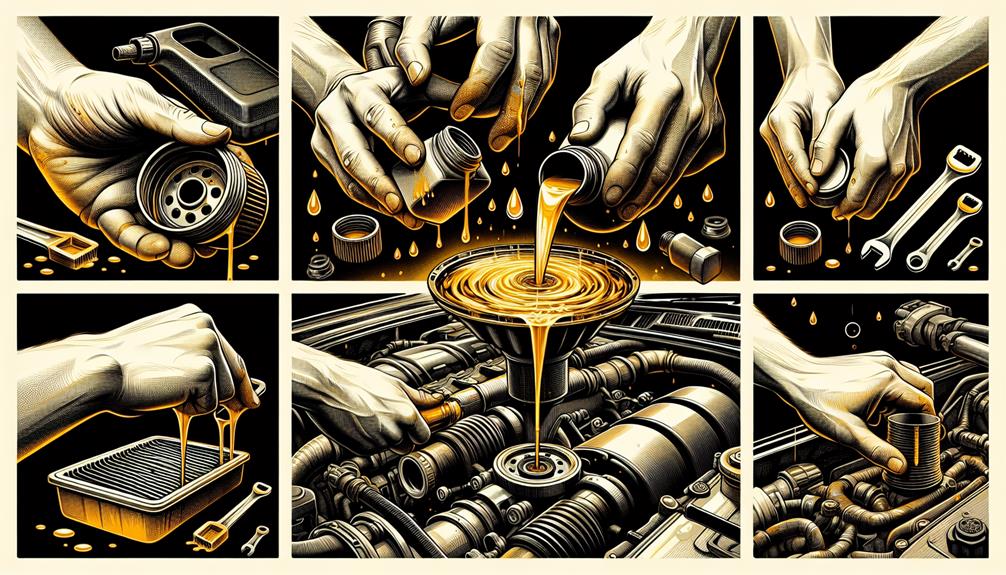Are you familiar with the story of the tortoise and the hare? Just like the hare, your car's engine can be running full speed ahead, but without regular maintenance, it may end up losing the race.
One important aspect of car maintenance is getting regular oil changes. But how do you know when it's time to bring your vehicle in for this crucial service?
In this discussion, we will explore the eight best signs that indicate your car is in need of an oil change. These signs may not be immediately obvious, but they could save you from costly repairs down the road.
Key Takeaways
- Dashboard warning lights, such as the oil pressure and oil level warning lights, indicate potential issues with the engine oil. Ignoring these warning lights can result in costly repairs.
- Unusual engine noises, such as grinding, clicking, or whining sounds, may suggest engine problems and should be addressed promptly. These noises can be signs of serious engine damage.
- Strange noises while driving, such as knocking, squealing, or grinding sounds, can lead to reduced power and engine stalling. Professional mechanic inspection is necessary to identify and resolve these issues.
- Strange odors, such as a burning smell, indicate potential issues with the engine, such as oil leaks, overheating, or dirty oil. Ignoring these warning signs can lead to costly repairs and engine damage. Regularly changing oil is crucial for maintaining a healthy engine.
Dashboard Warning Lights
If your dashboard warning lights are illuminated, it's crucial that you take immediate action to diagnose and address any potential issues with your vehicle's oil change. Dashboard warning lights serve as important indicators of various vehicle malfunctions, including problems related to engine oil. These warning lights are designed to alert you to potential issues in the engine that could lead to serious damage if left unattended.
One of the most common dashboard warning lights related to engine trouble is the oil pressure warning light. This light typically appears as an oil can symbol or an exclamation mark inside a circle. When this light illuminates, it indicates a drop in oil pressure, which can be caused by low oil levels or a malfunctioning oil pump. Ignoring this warning can result in engine damage or failure.
Another dashboard warning light to be aware of is the oil level warning light. This light typically appears as an oil can symbol with a wavy line underneath. It indicates that the engine oil level is low and needs to be topped up. Driving with low oil levels can lead to increased friction and overheating, potentially causing severe engine damage.
Strange Engine Noises
When it comes to strange engine noises, there are a few key points to keep in mind.
First, listen for any unusual sounds coming from your engine, such as grinding, clicking, or whining noises.
Second, pay attention to any strange noises that occur while you're driving, as this could indicate a problem with your engine.
Lastly, be aware of any engine rattling or knocking sounds, as these could be signs of a more serious issue that requires immediate attention.
Unusual Engine Sounds
Unusual engine sounds can be indicative of potential issues with your vehicle's engine and should be addressed promptly to avoid further damage. Engine maintenance and diagnostics are crucial in identifying and resolving these issues. Here are some common unusual engine sounds and their possible causes:
| Sound | Possible Cause |
|---|---|
| Knocking | Worn-out engine bearings |
| Whining | Faulty power steering pump |
| Hissing | Leaking vacuum hose |
A knocking sound could indicate worn-out engine bearings, which can lead to engine failure if not addressed promptly. A whining noise might be caused by a faulty power steering pump, which can impair your vehicle's steering capabilities. Hissing sounds can be traced back to a leaking vacuum hose, which can affect engine performance and fuel efficiency. If you notice any of these sounds, it is crucial to have your vehicle inspected by a professional mechanic to diagnose and resolve the underlying issues.
Strange Noises While Driving
Strange engine noises while driving can be an indication of potential issues with your vehicle's engine that should be addressed promptly to prevent further damage. One strange engine noise that you may encounter is a knocking sound. This could be caused by a lack of lubrication or worn-out bearings.
Another noise to watch out for is a squealing or screeching sound, which could indicate a loose or worn-out belt.
Additionally, a grinding noise could suggest a problem with your transmission or differential.
It's important to pay attention to these strange noises as they can lead to a reduction in power and even engine stalling. If you notice any of these sounds, it's best to have your vehicle inspected by a professional mechanic to identify and resolve any underlying issues.
Engine Rattling or Knocking
If you hear a rattling or knocking sound coming from your engine, it's important to address this issue promptly to prevent potential damage to your vehicle. Engine rattling or knocking is often a sign of poor engine maintenance or a lack of regular oil changes.
When the engine oil becomes dirty or low, it fails to lubricate the moving parts effectively. This can result in increased friction and wear, leading to engine rattling or knocking. Regular oil changes are essential to keep your engine running smoothly and prevent such issues. By replacing the old, dirty oil with fresh, clean oil, you ensure proper lubrication and reduce the risk of engine noise.
Ignoring these sounds can lead to severe engine damage, so it's crucial to schedule an oil change immediately if you hear any rattling or knocking.
Dark and Dirty Oil
When your oil appears dark and dirty, it's a clear indication that it's time for an oil change. Clean oil is essential for optimal engine performance, and when it becomes contaminated with dirt, debris, and other particles, it loses its ability to lubricate and protect the engine components effectively.
As the oil circulates through the engine, it picks up impurities, such as carbon deposits, metal shavings, and sludge. Over time, these contaminants accumulate and cause the oil to darken and become dirty.
Dark and dirty oil not only fails to provide sufficient lubrication to the engine parts but also hinders the oil's ability to regulate temperature and clean the engine. As a result, the engine may experience increased friction, leading to excessive wear and tear on crucial components. This can lead to decreased engine performance, reduced fuel efficiency, and potentially even engine damage.
Regularly checking the color and clarity of your oil is vital in maintaining the health of your engine. If you notice that your oil has turned dark and dirty, it's crucial to schedule an oil change promptly. By doing so, you'll help prolong the life of your engine and ensure that it continues to operate at its best.
Decreased Fuel Efficiency
When the oil in your engine becomes dark and dirty, not only does it fail to properly lubricate and protect crucial engine components, but it can also lead to decreased fuel efficiency. This is because dirty oil contains impurities and contaminants that can hinder the smooth and efficient operation of your engine.
Here are three ways in which dirty oil can negatively affect your fuel efficiency:
- Increased Friction: As oil gets contaminated with particles and debris, it becomes thicker and less effective at reducing friction between moving engine parts. This increased friction translates into decreased performance and a higher fuel consumption rate.
- Reduced Engine Efficiency: Engine sludge, which is formed by a combination of dirt, soot, and other contaminants, can accumulate in your engine over time. This sludge restricts the flow of oil and can clog important passages, causing the engine to work harder and consume more fuel to compensate for the reduced efficiency.
- Inefficient Combustion: Dirty oil can also affect the combustion process in your engine. As the oil loses its ability to properly lubricate and cool the engine, it can lead to increased heat and wear. This can result in incomplete combustion of the fuel, leading to decreased fuel efficiency and higher emissions.
To maintain optimal fuel efficiency and engine performance, it's crucial to regularly change your oil and keep it clean. By doing so, you can ensure that your engine operates smoothly and efficiently, while also prolonging its lifespan.
Burning Smell
If you detect a burning smell coming from your vehicle, it could be a sign that your oil needs to be changed. This odor may be accompanied by smoke or fumes, indicating that the oil is overheating or burning.
Ignoring this warning sign can lead to engine damage or even a potential fire hazard, so it's crucial to address the issue promptly by getting an oil change.
Strange Odor
You may notice a distinct burning smell, indicating a potential issue that requires an oil change. This foul stench or unusual aroma can be a warning sign of a serious problem with your vehicle's engine oil.
Here are three possible causes for this strange odor:
- Oil Leak: A burning smell could indicate an oil leak, which is a serious issue that needs immediate attention. Leaking oil can come into contact with hot engine parts and create a strong burning odor.
- Overheating Engine: If your engine is running too hot, it can cause the oil to break down and emit a burning smell. This can be caused by a malfunctioning cooling system or a lack of oil circulation.
- Dirty or Old Oil: When oil becomes dirty or old, it loses its lubricating properties and can start to burn, resulting in a distinct odor. Regularly changing your oil is crucial to maintaining a healthy engine.
If you notice any strange odors coming from your vehicle, it's important to address the issue promptly by getting an oil change. Neglecting this warning sign can lead to costly repairs and potential engine damage.
Smoke or Fumes
Detecting smoke or fumes emitting a burning smell from your vehicle can indicate a serious issue that requires immediate attention and an oil change.
Smoke detection and fumes analysis are essential in determining the cause of the burning smell.
One possible cause could be an oil leak, where the leaking oil comes into contact with hot engine parts and burns, resulting in smoke and a distinct odor.
Another potential cause could be a faulty catalytic converter, which can lead to the production of harmful fumes and a burning smell.
Additionally, a malfunctioning fuel system or electrical issue could also be responsible for the smoke and fumes.
It's crucial to address these issues promptly to prevent further damage to your vehicle and ensure your safety on the road.
Visit a trusted mechanic for a thorough inspection and an oil change to resolve the problem.
Excessive Exhaust Smoke
Excessive exhaust smoke can indicate a potential issue with your vehicle's engine or emissions system. It's important to pay attention to the color, thickness, and smell of the smoke, as these characteristics can provide valuable clues about the underlying problem.
Here are three key factors to consider:
- Color: The color of the smoke can help determine the source of the issue. If the smoke is white or light gray, it could be a sign of excessive oil consumption. This may indicate that oil is being burned in the combustion chamber, possibly due to worn piston rings or valve seals. On the other hand, blue or bluish-gray smoke is often associated with oil leaks. This could be caused by a faulty gasket or seal, leading to oil entering the combustion chamber and being burned along with the fuel.
- Thickness: The thickness of the smoke can provide insights into the severity of the problem. If the smoke is thin and dissipates quickly, it may not be a cause for immediate concern. However, if the smoke is thick and lingers in the air, it suggests a more serious issue that requires prompt attention.
- Smell: The smell of the smoke can also indicate the nature of the problem. A sweet smell may suggest that coolant is being burned, indicating a potential coolant leak. In contrast, a burnt or acrid smell could be a sign of oil burning, indicating a problem with the engine.
Engine Overheating
If you have noticed any signs of excessive exhaust smoke, it's crucial to address the issue promptly to prevent further damage to your vehicle's engine or emissions system.
Another important sign to look out for is engine overheating. Engine overheating can be caused by various factors, including a malfunctioning cooling system or a coolant leak. The engine coolant plays a vital role in regulating the temperature of your engine. It circulates through the engine and absorbs heat, preventing it from overheating. However, if there's a coolant leak, the coolant level can drop, leading to inadequate cooling and eventual engine overheating.
There are several signs that indicate engine overheating. One of the most obvious signs is an increase in the temperature gauge reading. If you notice that the gauge is consistently in the red zone or higher than normal, it's a clear indication that your engine is overheating. Another sign of engine overheating is the presence of steam or smoke coming from under the hood. This can be caused by the coolant boiling and evaporating due to the high temperature.
If you experience any of these signs, it's crucial to stop driving immediately and address the issue. Continuing to drive with an overheating engine can cause severe damage and potentially lead to a complete engine failure. It's recommended to have your vehicle inspected by a professional mechanic to diagnose and repair any coolant leaks or cooling system issues promptly.
Oil Change Reminder Light
When the oil change reminder light illuminates on your vehicle's dashboard, it's a clear indication that it's time to have your oil changed. This light is a crucial part of your vehicle's maintenance schedule, as it ensures that your engine is running smoothly and efficiently.
Here are three important things to know about the oil change reminder light:
- Accurate Monitoring: The oil change reminder light is designed to monitor the condition of your engine oil based on factors such as mileage, engine temperature, and driving conditions. It uses advanced sensors to analyze the oil's viscosity and contamination levels, providing an accurate assessment of when it needs to be changed.
- Timely Maintenance: Ignoring the oil change reminder light can lead to serious engine damage. Over time, the oil becomes contaminated with debris and loses its lubricating properties, causing increased friction and wear on engine components. By adhering to the light's prompt, you can prevent unnecessary engine wear and extend the life of your vehicle.
- Resetting the Light: Once you have performed the oil change, it's essential to reset the oil change reminder light. This can typically be done through a simple procedure outlined in your vehicle's owner manual. By resetting the light, you ensure that the system accurately tracks your next oil change interval.
Frequently Asked Questions
How Often Should I Change My Oil?
You should change your oil at regular intervals to maintain the health of your engine. The frequency of oil changes depends on factors such as your vehicle's make, model, and usage. Consult your owner's manual or a trusted mechanic for specific recommendations on oil change frequency.
Can I Change My Oil Myself or Should I Take It to a Professional?
You might be tempted to do it yourself, but before you get your hands dirty, consider the benefits of a professional oil change. They have the expertise, tools, and access to quality products.
What Type of Oil Should I Use for My Car?
Choosing the right oil for your vehicle is crucial. Synthetic oil offers better performance and protection, while conventional oil is more affordable. Regular oil changes are essential for optimal engine performance, preventing damage and extending the lifespan of your car.
What Are the Consequences of Not Changing My Oil Regularly?
If you neglect regular oil changes, the consequences can be severe. Contaminated oil can damage your engine, leading to decreased performance and potential breakdowns. Don't overlook this essential maintenance task.
Are There Any Specific Signs That Indicate My Car Needs an Oil Change Other Than the Ones Mentioned in the Article?
If you're wondering if there are any other signs besides the ones mentioned in the article that indicate your car needs an oil change, signs of oil leakage and understanding how to choose the right oil for your car are important considerations.
Conclusion
In conclusion, keeping an eye out for the 8 best signs for an oil change is crucial for maintaining the health and performance of your vehicle.
Ignoring these signs could lead to serious engine damage and costly repairs.
Just like a well-tuned instrument, regular oil changes ensure that your engine runs smoothly and efficiently, allowing you to enjoy a smooth ride and prolonging the life of your vehicle.
Don't let your engine become a symphony of problems, stay proactive and schedule your oil change today.



